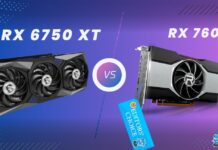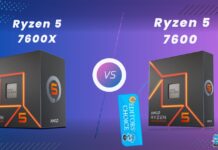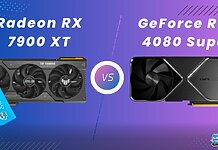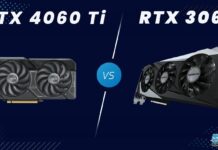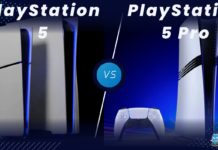Welcome to a comprehensive exploration of two powerful processors in the realm of computing – the Core i7 1360P vs Ryzen 7 7840U. In this article, we delve into their intricate specifications and rigorous performance benchmarks, aiming to unravel which of these chips will emerge as the ideal companion for your computing needs. Join us as we navigate through their capabilities and unveil the potential of each processor.
Key Takeaways
- If your workflow heavily relies on single-core performance, the Core i7 1360P demonstrates a modest 0.6% lead on average in specific benchmarks.
- On the other hand, when it comes to multi-core workloads, the Ryzen 7 7840U showcases a substantial 9.4% performance surge on average in some benchmarks.
- With an impressive memory support of up to 256GB, the Ryzen 7 7840U provides ample room for memory-intensive applications.
- While both processors offer configurable TDPs, the Ryzen 7 7840U presents a wider 15-30W range. This flexibility empowers users to adjust performance and power efficiency finely.
Comparison Table
| Key Specifications | Core i7 1360P | Ryzen 7 7840U |
|---|---|---|
| Vendor | Intel | AMD |
| Release Date | January 3, 2023 | May 3, 2023 |
| Device Type | Laptop | Laptop |
| Instruction Set | x86-64 | x86-64 |
| Integrated GPU | Iris Xe Graphics (96EU) | Radeon 780M |
| Performance Cores | 4 | 8 |
| Performance Threads | 8 | 16 |
| Base Clock | 2.2 GHz | 3.3 GHz |
| Boost Clock | 5 GHz | 5.1 GHz |
| Total Cores | 12 | 8 |
| Total Threads | 16 | 16 |
| L1 Cache | 80K (per core) | 64K (per core) |
| L2 Cache | 2MB (per core) | 1MB (per core) |
| L3 Cache | 18MB (shared) | 16MB (shared) |
| Fabrication Process | 10nm | 4nm |
| TDP (PL1) | 20-28W (configurable) | 15-30W (configurable) |
| Socket | BGA-1744 | FP8 |
| GPU Base Clock | 300 MHz | 1500 MHz |
| GPU Boost Clock | 1500 MHz | 2700 MHz |
| Cuda Cores | 768 | 768 |
| Execution Units | 96 | 12 |
| Memory Support | Up to 64GB | Up to 256GB |
| ECC Support | No | Yes |
| PCI Express Version | Gen 4.0 | Gen 4.0 |
Architectural Differences
As we dive into the architectural differences of the Core i7 1360P and Ryzen 7 7840U, we lay the foundation for understanding how these processors differentiate in terms of design, technology, and performance optimizations. These architectural disparities often translate into divergent capabilities that directly influence real-world tasks and applications.
- Process Node: On the forefront of the processing node, the Core i7 1360P harnesses advanced 10nm technology, while the Ryzen 7 7840U boasts cutting-edge engineering at an even finer 4nm process node.
- Clock Speed: Revealing their computational prowess, the Core i7 1360P features a Base Clock of 2.2 GHz with a Boost Clock of 5 GHz, while the Ryzen 7 7840U boasts a Base Clock of 3.3 GHz, surging to 5.1 GHz under load, underlining their distinct performance profiles.
- Memory Support Variation: Navigating memory landscapes, the Core i7 1360P accommodates memory capacities up to 64GB, whereas the Ryzen 7 7840U stretches its boundaries, supporting an impressive 256GB, suitable for demanding memory-hungry tasks.
- TDP: Moreover, balancing performance and energy efficiency, the Core i7 1360P operates within a configurable TDP range of 20-28W, while the Ryzen 7 7840U offers a wider power spectrum of 15-30W, catering to varied usage scenarios and power preferences.
- Supported Technologies: Unraveling technological disparities, the Core i7 1360P lacks ECC memory support, whereas the Ryzen 7 7840U stands fortified with ECC memory compatibility, enhancing data integrity for critical computing applications.
Core i7 1360P Vs Ryzen 7 7840U: Performance Benchmarks
Now, let’s transition into the realm of performance benchmarks, where we’ll witness these architectural disparities come to life. Through rigorous testing across various benchmark software, we’ll gauge the prowess of the Core i7 1360P and Ryzen 7 7840U, shedding light on their ability to handle everything from single-core responsiveness to multi-core workloads.
Cinebench R23 (Single-Core)
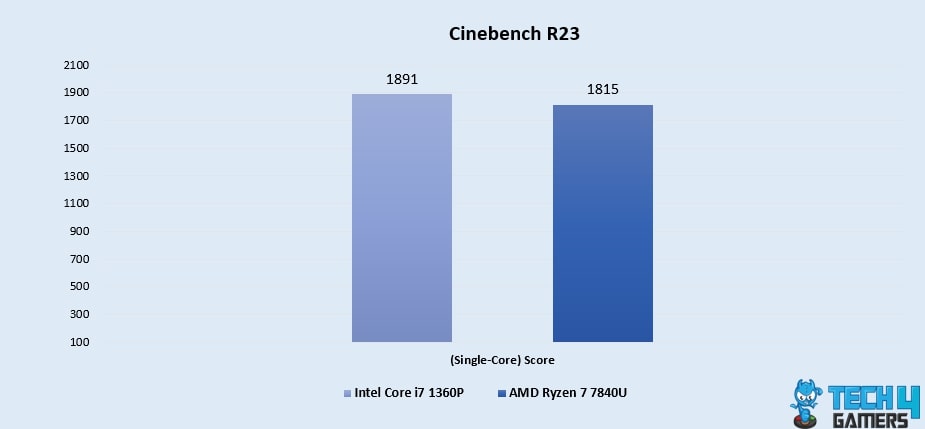
- In single-core performance, the Core i7 1360P demonstrates a 4.1% performance gain with a score of 1891, compared to the Ryzen 7 7840U’s score of 1815, highlighting its efficiency in handling individual tasks.
Cinebench R23 (Multi-Core)
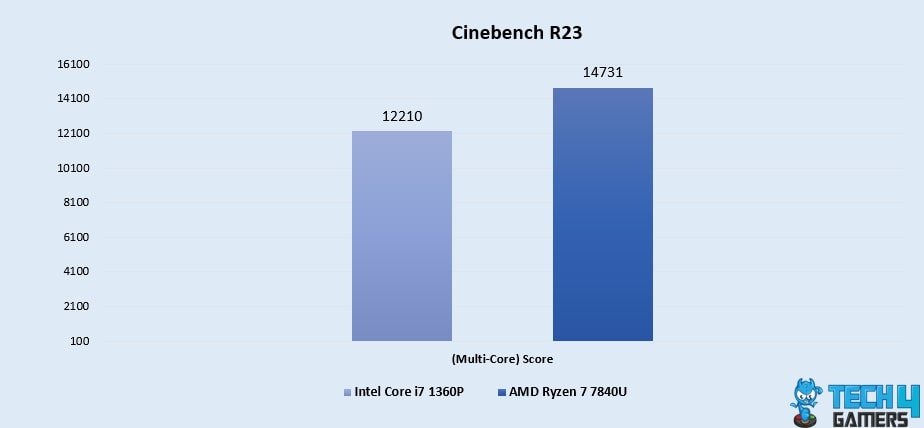
- Transitioning to multi-core scenarios, the Ryzen 7 7840U exhibits an 18.7% performance lead with a Cinebench R23 score of 14731, outperforming the Core i7 1360P’s score of 12210 in multi-threaded workloads.
Geekbench 5 (Single-Core)
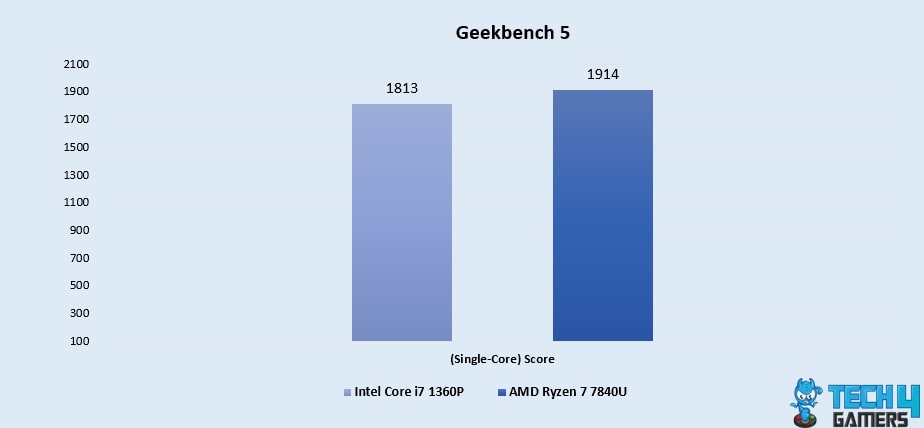
- Shifting the focus to single-core performance in Geekbench 5, the Ryzen 7 7840U maintains a 5.4% performance advantage with a score of 1914, surpassing the Core i7 1360P’s score of 1813, emphasizing its ability to handle single-threaded tasks effectively.
Geekbench 5 (Multi-Core)
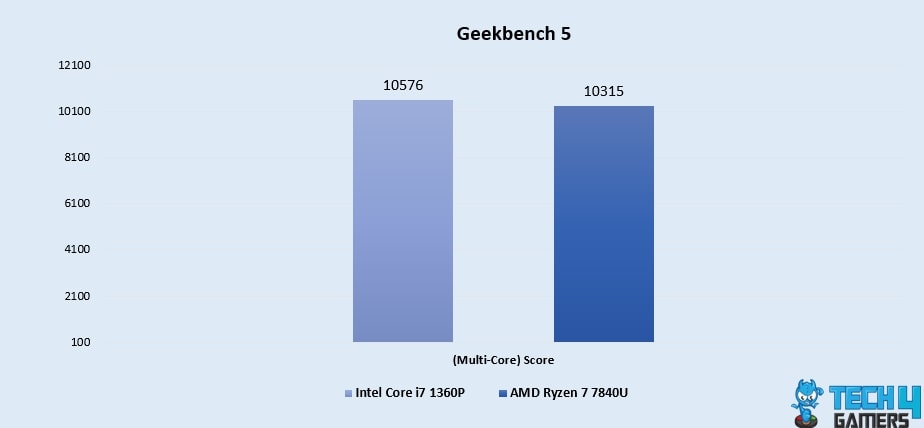
- Multi-core performance in Geekbench 5 presents a balanced perspective, as the Core i7 1360P achieves a slight 2.4% performance lead with a score of 10576, surpassing the Ryzen 7 7840U’s score of 10315, showcasing its capability in managing multi-threaded workloads.
Ryzen 7 7840U Vs Core i7 1360P: Which One Is Right For You?
- If you prioritize single-core performance, the Core i7 1360P offers a 0.6% advantage on average in certain benchmarks, making it a suitable choice for users seeking swift execution of individual tasks and applications.
- Furthermore, for users dealing with multi-core workloads, the Ryzen 7 7840U takes the lead with a notable 9.4% performance gain on average in specific benchmarks, highlighting its capability to handle resource-intensive scenarios and multitasking demands.
- Moreover, using memory support of up to a remarkable 256GB, the Ryzen 7 7840U provides substantial capacity for memory-intensive applications, making it ideal for users engaged in data-intensive tasks.
- Finally, both chips provide configurable TDPs, but the Ryzen 7 7840U offers a broader range of 15-30W, allowing users to finely tailor their performance and power efficiency preferences, whereas the Core i7 1360P operates within a range of 20-28W.
Thank you! Please share your positive feedback. 🔋
How could we improve this post? Please Help us. 😔
[Comparisons Expert]
Shehryar Khan, a seasoned PC hardware expert, brings over three years of extensive experience and a deep passion for the world of technology. With a love for building PCs and a genuine enthusiasm for exploring the latest advancements in components, his expertise shines through his work and dedication towards this field. Currently, Shehryar is rocking a custom loop setup for his built.
Get In Touch: shehryar@tech4gamers.com


 Threads
Threads